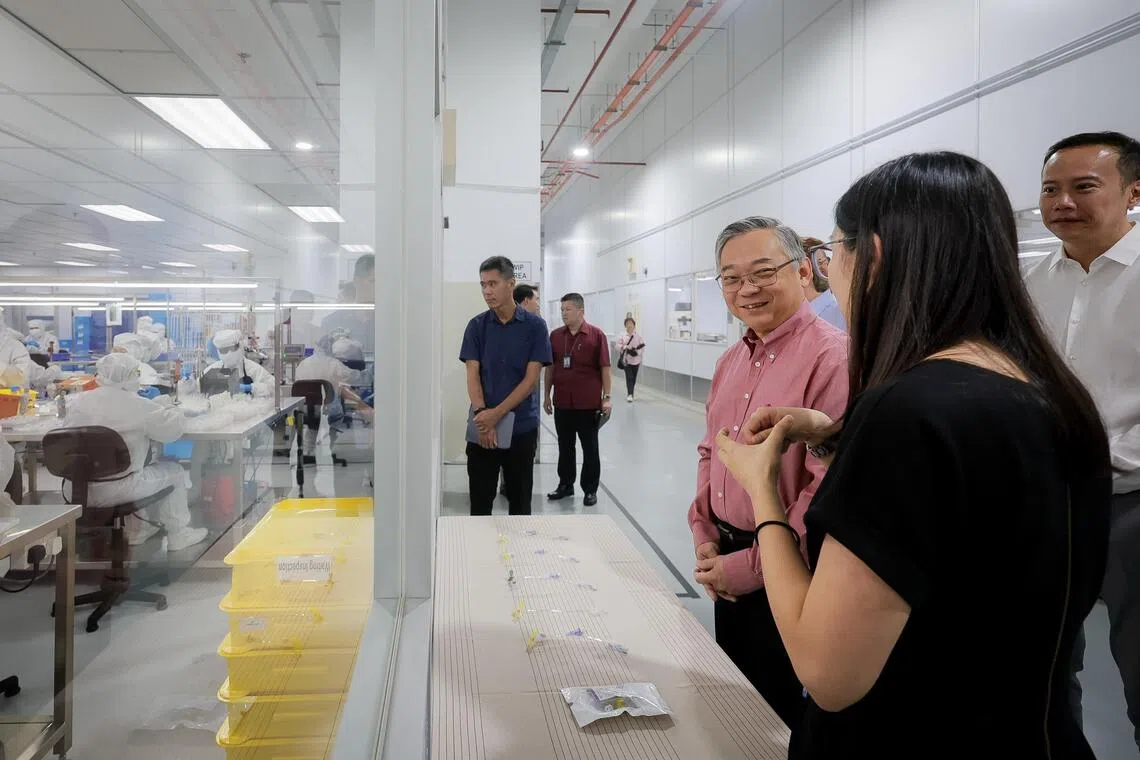New grant of up to $100k to help Singapore SMEs deal with US tariffs opens for applications
Sign up now: Get ST's newsletters delivered to your inbox

Deputy Prime Minister Gan Kim Yong visiting medical device contract manufacturer Forefront Medical Technology on Oct 7.
ST PHOTO: GAVIN FOO
Follow topic:
- Singapore launches the Business Adaptation Grant (BizAdapt) to aid businesses affected by US tariffs, offering up to 50% funding for SMEs and 30% for larger firms.
- The grant supports advisory services for trade compliance, legal matters and supply chain optimisation.
- Companies must be Singapore-based, tariff-affected, and seek advice from approved partners.
AI generated
SINGAPORE – Local businesses that have been hit by US tariffs can now apply for a grant to help them engage third-party advisory services and reconfigure their supply chains.
The Business Adaptation Grant (BizAdapt) allows small and medium-sized enterprises (SMEs) to claim up to 50 per cent of eligible costs, while larger companies can claim up to 30 per cent, with a cap of $100,000 per company.
The grant from Enterprise Singapore is open for application on the Business Grants Portal for a two-year period ending Oct 6, 2027.
The measure was first announced by the Singapore Economic Resilience Taskforce (SERT)
The US placed “reciprocal” levies on more than 90 countries in August. It was due to impose tariffs on the pharmaceuticals sector on Oct 1, but those have since been delayed.
Mr Mark Lee, vice-chairman of the Singapore Business Federation, said many companies have started to take steps to diversify their supply chains in terms of suppliers, manufacturing sites and consumer markets.
“The grant allows you to diversify your risk. Every dollar counts in today’s environment, which is volatile and certainly very uncertain,” he said.
Deputy Prime Minister Gan Kim Yong, the chairman of SERT, said the grant will help businesses that are directly impacted by tariffs because they export to the US.
But it also targets firms that are exporting goods to other markets that will eventually be made into products sent to America.
“Both the direct and indirect impact are something that we have to continue to watch and monitor,” said DPM Gan, who is also Minister for Trade and Industry.
“BizAdapt will help to mitigate the impact of this tariff pressure, but, at the same time, also give (businesses) opportunities to see how they can seize emerging opportunities.”
He added that the Government will evaluate whether the grant should be extended beyond two years, or if other schemes and programmes can be used to support companies in the future business environment.
DPM Gan spoke to reporters on the sidelines of a site visit to medical device contract manufacturer Forefront Medical Technology.
The Singapore company has production facilities in the Republic, China, the United Kingdom and Mexico.
It has faced challenges as tariffs have increased costs for its customers, which are mainly in the US and Europe, said Forefront Medical’s president Walter Tarca.
He is encouraging customers to move some manufacturing to Singapore, which faces lower US tariffs than most markets around the world.
The company is currently extending a clean room at its Singapore facility to give it more capacity to accept new projects that may be transferred from other manufacturing locations.
Mr Tarca said the grant could be used to defray the costs of reconfiguring the company’s supply chain.
“The supply chain reconfiguration element of the grant is most appealing to us. When you are shifting supply chains, it is not just moving machines. The compliance and revalidation factors make it very costly,” he said.
Businesses looking to tap the grant need to be registered and have operations in Singapore, with at least 30 per cent of local equity being held by Singapore citizens or permanent residents. Companies also have to demonstrate that they operate in or export to overseas markets, and that they have been impacted by tariffs.
They can seek advisory services from a shortlist of partners in these areas – free trade agreement (FTA) and trade compliance, legal and contractual matters, and supply chain optimisation and market diversification.
In the area of trade, businesses can seek an in-depth assessment of opportunities available via FTAs, a trade compliance assessment and advice on Customs compliance processes, considering export controls and sanctions.
On the legal front, they can get advice on the reviewing and redrafting of contracts and dispute resolution strategies.
Supply chain advisory, meanwhile, covers an assessment of the financial impact of tariffs, while that of market diversification includes entry strategies to new territories.
Applicants seeking funding for the reconfiguration of supply chains have to also show that their manufacturing operations require support.
That funding is specifically for costs related to logistics such as freight charges, handling and Customs clearance fees. It also supports inventory costs, including warehouse rentals and the deployment of inventory management systems.
Companies unsure if they qualify for the reconfiguration funding can approach the Singapore Business Federation’s Centre for the Future of Trade and Investment.
DPM Gan said BizAdapt complements other support schemes funded by the Government, including a traineeship scheme for recent and soon-to-be graduates
Applications for the traineeships started in October, with up to 800 positions offered across various sectors for a start, each lasting three to six months.


